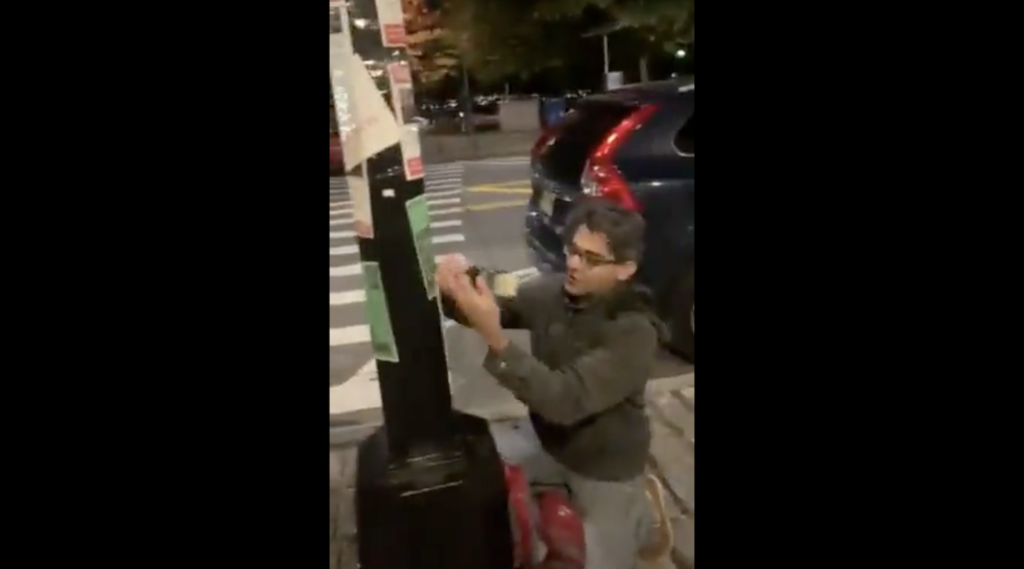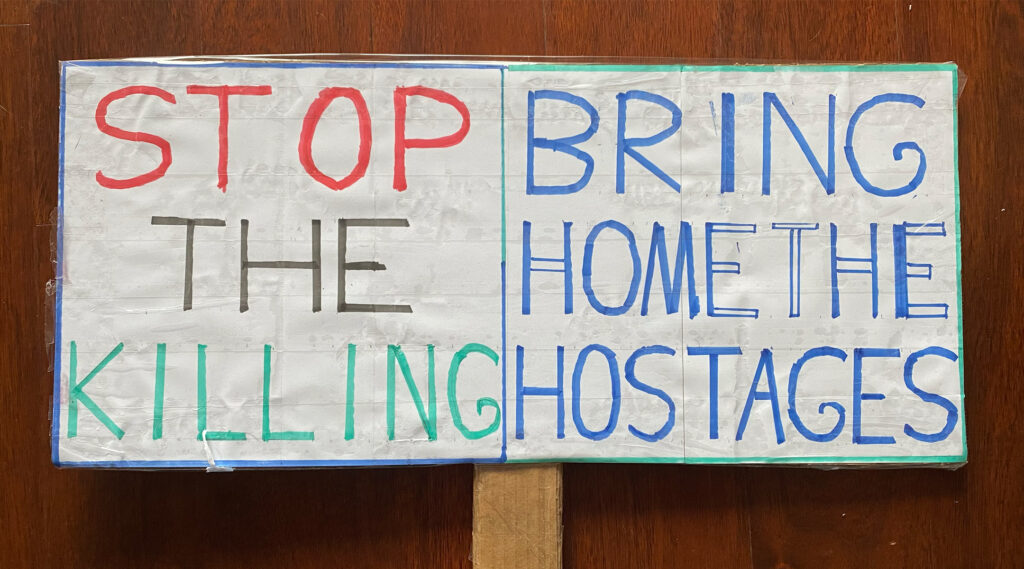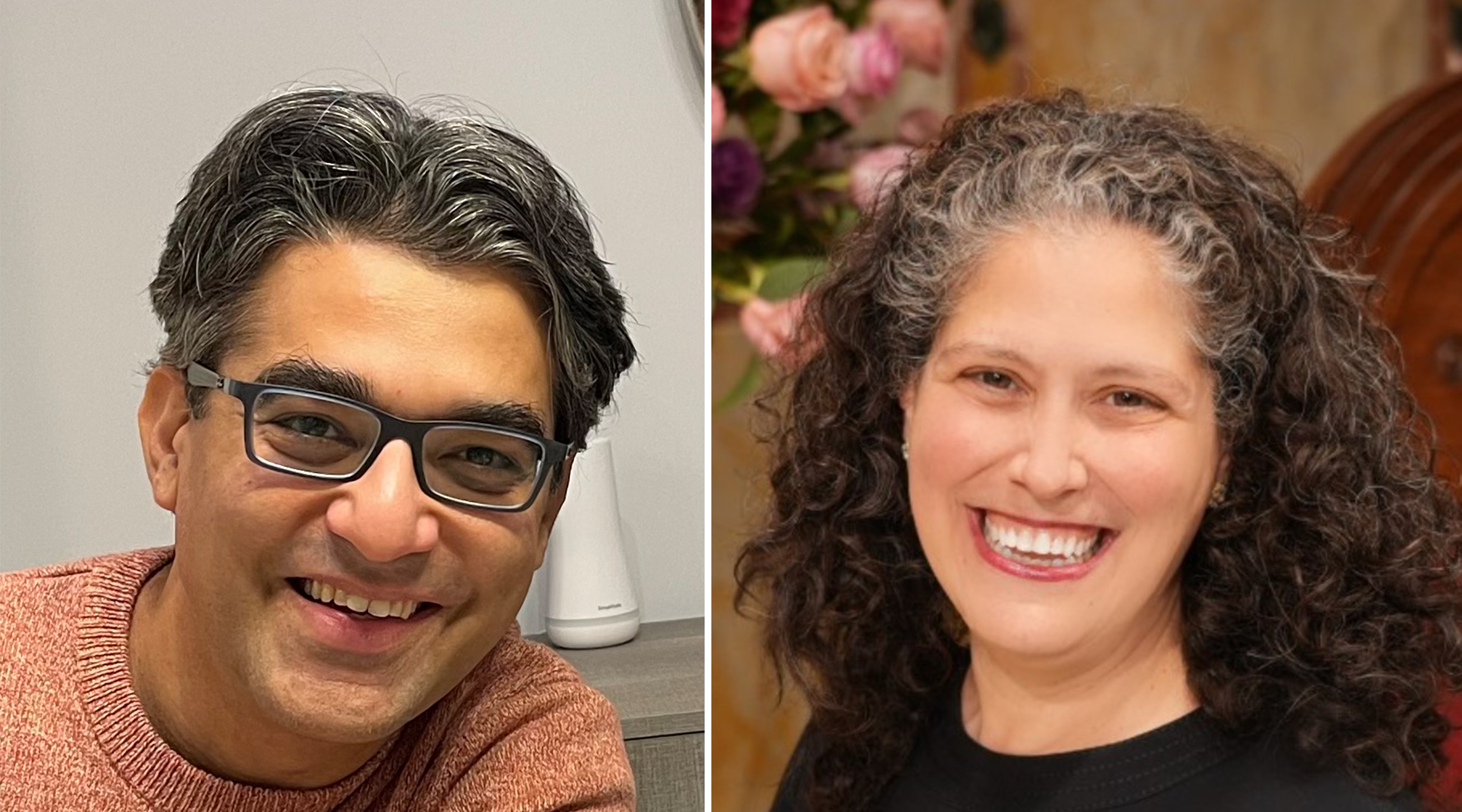The friendship between Kurush Mistry and Sarah Reines is an unlikely one.
Mistry, 45, made headlines in November 2023 for covering up “kidnapped” hostage posters with anti-Israel ones. A viral video of the Upper West Side incident — which was published by a number of news outlets online — drew widespread ire and got him fired from his job as a Wall Street analyst.
Reines, meanwhile, is an associate rabbi at Temple Emanu-El on the Upper East Side, where advocacy for the Israeli hostages in Gaza has been part of the congregation’s mission since Hamas’ Oct. 7, 2023 attack on Israel.
The incident could have made the pair into adversaries. But something else happened: Mistry sought to make amends with the Jewish community, beginning a path of repentance, known as teshuvah in Hebrew, that ultimately brought him to Reines’ office. Over the past 14 months, the two have developed a “deep friendship,” in Mistry’s words, characterized by honest and civil discussions about a subject that often lends itself to heated arguments and the fracturing of relationships.
And now, on Saturday evening, Mistry will be attending Reines’ Passover seder at her Upper East Side home.
“The seder is all about sharing ideas, questioning perspectives, debating, and it’s very hard to do that today,” said Reines, 56. “And I feel like my relationship with Kurush is a really powerful example of how that is possible.”
Inviting Mistry to sit at her 18-person seder table was important to Reines, who “wanted him to know that I consider him an important part of my circle,” she said. The rabbi also pointed out that she likes having people from different religious and ethnic backgrounds at her seder, as it invites people to “come to repeated words and rituals with fresh eyes and ears.”
Mistry and Reines first met over Zoom in January 2024 while Mistry was visiting his home country of India. Mistry had been living in New York City for nearly 20 years, but following the backlash to the viral video — in which he told the Jewish American man recording him to “go back to your country” — Mistry decided to “step away and reflect” with his family for a couple months in India.

A viral video of the incident got Mistry fired from his job as a Wall Street analyst and drew widespread ire. (Screenshot from X)
“The first few days [after the incident] were very challenging,” Mistry said. “I believe that my personal details had been leaked somewhere online. Therefore I was receiving threatening phone calls, text messages. I even got physical mail with some sort of white powder in it.”
Mistry wanted to make amends and give people “a better sense of the person that I am, despite my actions that night,” he said. So he reached out to a Jewish woman he knew professionally, who put him in touch with Reines. And following their introduction over Zoom, the two made an appointment for Mistry to visit her office at Temple Emanu-El.
“I remember feeling like, if he can walk into — you know, Temple Emanu-El is intimidating to anybody,” Reines said of Emanu-El’s grand Romanesque Revival building, which is one of the world’s largest synagogues. “So that he could come into that space and walk into my office, that felt like a sign that he was really coming with a sense of contrition and a willingness to be open.”
For Mistry, his many months of “honest and respectful, and sometimes painful” discussions with Reines have broadened his perspective, he said. (Mistry’s former wife, Shailja Gupta, was also embroiled in the incident, but the couple has since divorced.)
“I would say that my concern for the plight of people I believe are suffering or oppressed is no less than it was at the time of the incident,” he said in a phone interview Thursday morning. “But I have a better appreciation for other people’s suffering, and that I shouldn’t cancel one out to appreciate the other.” (In the viral video, he had covered a hostage poster with a flyer that read, “Israel is an apartheid state and commits genocide.”)
What started as a single meeting in January turned into regular conversations every couple weeks in Reines’ office. “I saw a person who did something they regretted,” Reines said, “and was actually trying to learn from that — grow, rectify.”
She added, “I never once questioned meeting with him. To me it was an honor from the beginning.”
Reines outlined for Mistry the process of teshuvah, which includes confession, regret and a vow not to repeat the misdeed. As part of the process, Reines gave him materials to read about the history of Israel and prejudice against Jews, which Mistry said “definitely enriched my understanding of these complex issues.”
Since the incident, Mistry said he has also made an effort to do more work for Dorot, a social services agency, where he’d already done some volunteering prior to his brush with infamy, helping seniors use technology.
One moment that stood out for Mistry on his path to redemption was in September 2024, when Reines invited him to attend a protest together as Israeli Prime Minister Benjamin Netanyahu delivered a speech at the United Nations.
“I took a sign to that protest, which I believe had two parts to it: Stop the killing, bring home the hostages,” Mistry said.

Mistry’s homemade sign at a Sept. 2024 protest included the colors of both the Palestinian and Israeli flags. (Courtesy)
His homemade sign included the colors of the Israeli and Palestinian flags melded together as a symbol of commonality. “I realized, as I was coming back from the protest, that it was cathartic, in a way, because this all started with me making signs,” Mistry said. “And I felt like I was doing this with a lot more thought and deliberation and in a much more balanced manner.”
Mistry added, “Short slogans are very amenable to our short attention span media coverage that we consume nowadays. But as I learned the hard way, they obviously can’t capture nuance, and they are not necessarily productive.”
Reines pointed out that her discussions with Mistry have helped her face shortcomings of her own. “He helped me realize that sometimes when I act emotionally to something like the word ‘genocide,’ I stop being able to absorb concrete information and have conversations,” she said. “Emotion can create walls in one’s own thinking.”
During last year’s Yom Kippur service, Reines delivered a sermon about Mistry and his process of redemption.
As for Passover, Reines said that redemption is “the very point” of the holiday. “It’s like Shabbat but on steroids,” she said. “ We celebrate and behave as if we are living in a liberated world, so that taste of what it would be like propels us forward to work for it.”
This year’s first-night seder will be a little different for Reines, who wrote her own haggadah. In addition to her family, the 18 attendees will include a number of guests who’ve never previously interacted, including a few non-Jewish ones.
Reines invited guests bring a dish that makes them think of their home, or the traditions in which they were raised. Mistry, who has attended two seders during his two decades in NYC, said he was “touched and honored” by the invite. He’s planning to bring a lamb dish he grew up eating — if his mother sends him the recipe in time, that is.
Reines said some parts of the Passover seder feel tough to reckon with in the current moment, like “celebrating freedom when there are hostages being held in Gaza,” she said, as well as saying “Let all who are hungry come and eat when we know there are Gazans and food is being withheld from them.”
Having Mistry at the table is “a sign that things can actually be different,” Reines said, “that there can be movement and growth and possibility.”
The New York Jewish Week brings you the stories behind the headlines, keeping you connected to Jewish life in New York. Help sustain the reporting you trust by donating today.




